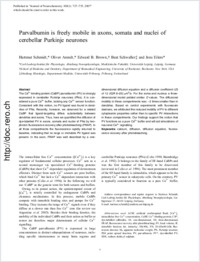Parvalbumin is freely mobile in axons, somata and nuclei of cerebellar Purkinje neurones
- Schmidt, Hartmut Carl-Ludwig-Institut für Physiologie, Abteilung Neurophysiologie, Medizinische Fakultät, Universität Leipzig, Germany
- Arendt, Oliver Carl-Ludwig-Institut für Physiologie, Abteilung Neurophysiologie, Medizinische Fakultät, Universität Leipzig, Germany
- Brown, Edward B. School of Medicine and Dentistry, Department of Biomedical Engineering, University of Rochester, New York, USA
- Schwaller, Beat Abteilung Histologie, Departement Medizin, Universität Fribourg, Switzerland
- Eilers, Jens Carl-Ludwig-Institut für Physiologie, Abteilung Neurophysiologie, Medizinische Fakultät, Universität Leipzig, Germany
-
15.11.2006
Published in:
- Journal of Neurochemistry. - 2007, vol. 100, no. 3, p. 727–735
English
The Ca²⁺-binding protein (CaBP) parvalbumin (PV) is strongly expressed in cerebellar Purkinje neurones (PNs). It is considered a pure Ca²⁺ buffer, lacking any Ca²⁺ sensor function. Consistent with this notion, no PV ligand was found in dendrites of PNs. Recently, however, we observed for a related CaBP that ligand-targeting differs substantially between dendrites and axons. Thus, here we quantified the diffusion of dye-labelled PV in axons, somata and nuclei of PNs by two-photon fluorescence recovery after photobleaching (FRAP). In all three compartments the fluorescence rapidly returned to baseline, indicating that no large or immobile PV ligand was present. In the axon, FRAP was well described by a one-dimensional diffusion equation and a diffusion coefficient (D) of 12 (IQR 6–20) µm²/s. For the soma and nucleus a three-dimensional model yielded similar D values. The diffusional mobility in these compartments was ~3 times smaller than in dendrites. Based on control experiments with fluorescein dextrans, we attributed this reduced mobility of PV to different cytoplasmic properties rather than to specific PV interactions in these compartments. Our findings support the notion that PV functions as a pure Ca²⁺ buffer and will aid simulations of neuronal Ca²⁺ signalling.
- Faculty
- Faculté des sciences et de médecine
- Department
- Département de Médecine
- Language
-
- English
- Classification
- Biological sciences
- License
-
License undefined
- Identifiers
-
- RERO DOC 6663
- DOI 10.1111/j.1471-4159.2006.04231.x
- Persistent URL
- https://folia.unifr.ch/unifr/documents/300233
Statistics
Document views: 178
File downloads:
- pdf: 223
